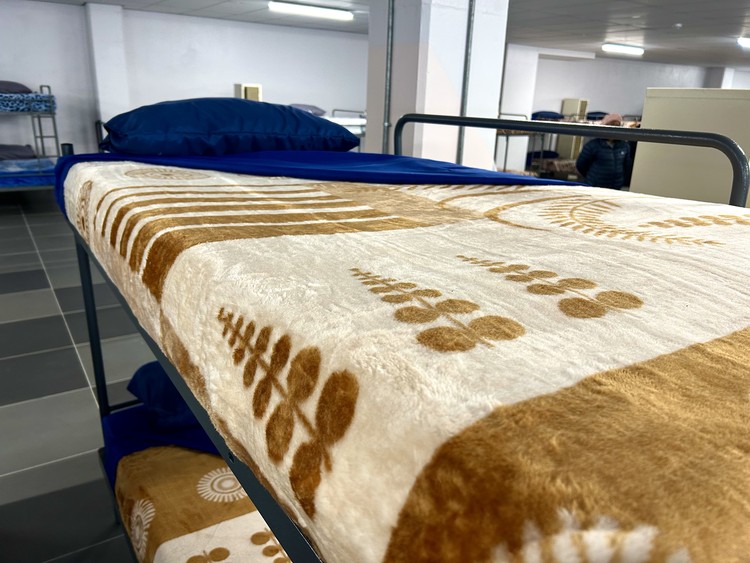New shelter for hundreds of homeless people opens in Green Point
This is one of five Safe Spaces run by the City of Cape Town
City of Cape Town official Megan Pangeni and Mayor Geordin Hill-Lewis toured the City’s new 300-bed Safe Space in Green Point on Monday. Photos: Matthew Hirsch
A new 300-bed shelter for homeless people in Green Point run by the City of Cape Town opened its doors on Monday.
This is one of five Safe Spaces for homeless people funded by the City.
The site for the shelter, at the municipal depot on Ebenezer Road, was approved by the City’s municipal planning tribunal in July last year following extensive public participation.
Mayor Geordin Hill-Lewis described the shelter as “beautiful” and said he hoped it would become “a place of life and restoration” for those who used it.
“We were really nervous about whether this would get community support and buy-in. We took several months to do public participation. In the end, we had lots of input and feedback with only one formal objection,” he added.
Speaking at the opening on Monday was Showen Loeks, who previously lived in Witbank. He said he had been a skilled technician but had stopped working and become homeless after his wife’s death.
Loeks said he had lived in a City Safe Space from October 2023 until April. He had access to services, hot meals and skills training which all helped him get back on his feet and move into his own apartment.
He urged people not to be too quick to judge people living and sleeping on the street.
This is one of five shelters funded by the City.
The City operates two Safe Spaces at Culemborg in the city centre with about 510 beds, one in Paint City Bellville with 220 beds, and one in Durbanville with 40 beds.
A new Safe Space is on the cards to serve the greater Muizenberg area. However, the proposed site, near Surfer’s Corner, has sparked some concern among locals and business owners. In a statement, Simon Roberts, chair of the Muizenberg Improvement District (MID) said that the MID supported the shelter but was concerned about the proposed location as it could affect tourism and economic activity.
On Monday Mayor Hill-Lewis said he hoped residents’ organisations would see the value the shelter could add in the south peninsula.
“There are hundreds, if not thousands, of complaints about homelessness and the impact on communities. The City has developed this as a caring and sustainable part of the solution. You cannot have on the one hand, communities complaining all day about homelessness, and also object to the solution to homelessness,” he said.
He said the City was also looking for a site in the Tokai-Bergvliet area.
Support independent journalism
Donate using Payfast

Don't miss out on the latest news
We respect your privacy, and promise we won't spam you.
Next: SASSA’s fraud management system is fraught with danger
Previous: Mpondoland dagga growers left out to dry
Letters
Dear Editor
If anyone from COCT had taken the time to actually LISTEN to the community, this would have worked so much better. This sort of safe space separates husbands and wives and families. What if someone has a beloved pet? This offers people no privacy or dignity. It looks like a prison. More people would use these beds and turn their lives around if they were treated with respect. The homeless were already refusing to go to the empty beds that were available.
And the rest of the communities around the areas where there are "vagrancy" issues live in fear and filth because COCT is not doing their job properly. We can't enjoy any of our parks or even walk along the river without fear of being robbed, getting a needle prick, stepping in faeces or a tik lolly. Somerset West is ruined by this. Businesses are closing because people can't go to our CBD without being harassed or threatened. No-one is winning here!
© 2024 GroundUp. This article is licensed under a Creative Commons Attribution-NoDerivatives 4.0 International License.
You may republish this article, so long as you credit the authors and GroundUp, and do not change the text. Please include a link back to the original article.
We put an invisible pixel in the article so that we can count traffic to republishers. All analytics tools are solely on our servers. We do not give our logs to any third party. Logs are deleted after two weeks. We do not use any IP address identifying information except to count regional traffic. We are solely interested in counting hits, not tracking users. If you republish, please do not delete the invisible pixel.


